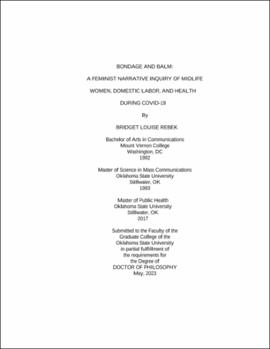| dc.contributor.advisor | Bailey, Lucy E. | |
| dc.contributor.author | Rebek, Bridget Louise | |
| dc.date.accessioned | 2023-08-30T19:45:23Z | |
| dc.date.available | 2023-08-30T19:45:23Z | |
| dc.date.issued | 2023-05 | |
| dc.identifier.uri | https://hdl.handle.net/11244/339037 | |
| dc.description.abstract | Among the many things we do not understand about COVID-19 is how pandemic-era domestic pressures manifest in the already-pressurized lives of women at midlife, a life stage characterized in the health literature as a period of great risk and tremendous possibility. Research conducted since the pandemic began indicates a number of factors, including a lopsided-by-gender domestic workload and sandwich generation caregiving demands, that could impact the health of midlife women. The purpose of this feminist qualitative study was to explore women’s experiences of the health impacts of their greater, disproportionate, and gendered pandemic domestic labor workload. To fulfill that purpose, I asked this research question: How do midlife women story the health impacts of their pandemic domestic labor? To answer this, I used feminist narrative inquiry guided by The Listening Guide methodology and methods. Narrators were five midlife women (defined for the purposes of this study as being 40 to 64 years old). I gathered each narrator’s stories during a series of four interviews. Each interview covered a period within the first 15 months of the pandemic. From these interviews, I harvested I-poems that foreground women’s voices and crystallize their experiences of pandemic domestic labor. Together with repeated listenings and readings of the interview recordings and transcripts, these analytic devices helped me to extract the layers of narrators’ experiences. What I heard from them became the four “listening layers” into which I organized the core findings of my study. This study foregrounds the details of women’s lives and takes seriously the connections between the domestic and women’s health. It considers the significance of space and women’s ongoing struggle to navigate their needs for sharing domestic labor with others in their households. Finally, it recognizes “seeing” domestic needs as a form of labor and makes visible the connection of seeing and doing domestic labor to the valuation of the women and their needs. This project unfolded during the pandemic as I shared these domestic and health challenges, reclaimed my identity by transitioning my name from Rebek to Lavish, and recognized the ongoing health implications of domestic labor. | |
| dc.format | application/pdf | |
| dc.language | en_US | |
| dc.rights | Copyright is held by the author who has granted the Oklahoma State University Library the non-exclusive right to share this material in its institutional repository. Contact Digital Library Services at lib-dls@okstate.edu or 405-744-9161 for the permission policy on the use, reproduction or distribution of this material. | |
| dc.title | Bondage and balm: A feminist narrative inquiry of midlife women, domestic labor, and health during COVID-19 | |
| dc.contributor.committeeMember | Croff, Julie | |
| dc.contributor.committeeMember | Hubach, Randolph | |
| dc.contributor.committeeMember | Rhoads, Kelley | |
| osu.filename | Rebek_okstate_0664D_18027.pdf | |
| osu.accesstype | Open Access | |
| dc.type.genre | Dissertation | |
| dc.type.material | Text | |
| dc.subject.keywords | COVID-19 pandemic | |
| dc.subject.keywords | feminist narrative inquiry | |
| dc.subject.keywords | health | |
| dc.subject.keywords | midlife women | |
| dc.subject.keywords | qualitative | |
| dc.subject.keywords | The Listening Guide | |
| thesis.degree.discipline | Health, Leisure and Human Performance | |
| thesis.degree.grantor | Oklahoma State University | |
